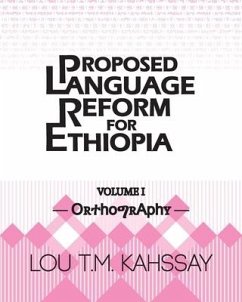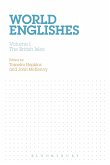The first of two volumes, this groundbreaking book is unparalleled in its insight into the Ethiopic grammatical and orthographic problems that have hindered the progress of the Ethiopian society, and its approach to presenting comprehensive reform ideas to tackle the problems. Written primarily for policy makers, this is the ultimate language material for anyone interested in the protection and development of Ethiopian languages. By focusing on Tigirinya and Amharic, the two most popular Ethio Semitic languages, the book aims to set an example for the reform of other Ethiopian languages, including the Ethio-Cushitic languages, to respond to the nation's 21st-century communication needs. After decades of neglect and mandatory use of English as the medium of instruction in the Ethiopian school system, Ethiopian languages are decimated to the point of almost becoming irrelevant for the complex communication needs of a modern society. As Ethiopia strives to use technology to develop its industrial base and leapfrog into a modern industrialized society, it urgently needs to implement reform of its languages without further delay.The major reforms proposed in this book, which number more than a dozen, cover grammar, orthography, and other things related to Ethiopic, such as a standard Ethiopic computer keyboard. The proposed reform of the Ethiopic script, which is a major component of the proposed orthographic reforms for Ethiopia, contrasts with the last major reform of the script during the reign of King Ezana almost 1700 years ago. Although there were some modern-day proposals for the reform of the script in the last hundred years, none were ever implemented nor was any one of them as comprehensive or as scientifically sound as the reforms proposed in this book. Researched and conceived by taking into account the opportunities and challenges provided by globalization and 21st-century technological innovations, many of the reform ideas are unique and unprecedented in the history of the Ethiopian languages. The decision to implement the proposed language reform will be made by policy makers and the Ethiopian society. However, as expounded in the book, every delay since the first effort to reform Ethiopic more than a century ago has cost society enormously. Now is the time to act for the sake of a modern and prosperous Ethiopia that will not only survive but thrive in a fast-changing modern world.
Hinweis: Dieser Artikel kann nur an eine deutsche Lieferadresse ausgeliefert werden.
Hinweis: Dieser Artikel kann nur an eine deutsche Lieferadresse ausgeliefert werden.








![Walker's Pronouncing Dictionary [microform]: in Which the Accentuation, Orthography and Pronunciation of the English Language Are Distinctly Shown, an Walker's Pronouncing Dictionary [microform]: in Which the Accentuation, Orthography and Pronunciation of the English Language Are Distinctly Shown, an](https://bilder.buecher.de/produkte/66/66152/66152040m.jpg)